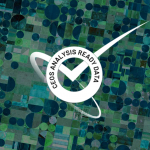LSI-VC: What Have They Been Up To?
This article is the second in a series of seven articles describing the role and work of the CEOS Virtual Constellations. The series of articles is as follows:
- Atmospheric Composition (AC-VC)
- Land Surface Imaging (LSI-VC) (this article)
- Ocean Colour Radiometry (OCR-VC)
- Ocean Surface Topography (OST-VC) (coming soon)
- Ocean Surface Vector Wind (OSVW-VC) (coming soon)
- Precipitation (P-VC) (coming soon)
- Sea Surface Temperature (SST-VC) (coming soon)
The CEOS Virtual Constellations (or ‘VCs’) are defined as “a set of space and ground segment capabilities operating together in a coordinated manner, in effect a virtual system that overlaps in coverage in order to meet a combined and common set of Earth observation requirements.” The interim goal of each VC is to demonstrate the value of a collaborative partnership in addressing a key observational gap, while the end goal is to sustain the routine collection of critical observations. For more on what the VCs are in general, see the process paper.
Renewed in 2015, the Land Surface Imaging Virtual Constellation (LSI-VC) aims to maximise the value derived from CEOS Agency land surface imaging assets and activities by providing an overarching coordination role. The work of LSI-VC spans a number of key coordination roles, including:
- Optimising the use of these assets to maximise global coverage and minimise important data gaps
- Making it easier for users to interact with such vast amounts and diversity of collected data, challenged by the ever-increasing depth of satellite imagery collections over time
- Supporting downstream users to better enable them to seamlessly utilise the data generated from these various systems.
Over the past seven years, LSI-VC has been very active in working towards these goals, establishing a number of programs and initiatives that span into broader CEOS goals & objectives.
CEOS Analysis Ready Data
In 2016, LSI-VC began development of the CEOS Analysis Ready Data (CEOS-ARD) concept, which addresses the latter two of the objectives above. Recognising that many satellite data users lack the expertise, infrastructure and internet bandwidth to efficiently and effectively access, preprocess, and utilise the growing volume of space-based data for local, regional, and national decision-making, LSI-VC sought to define specifications for families of key land surface products and encourage data providers to generate these ‘analysis-ready’ datasets as standard products. Datasets that meet these specifications have been pre-processed to a degree and provide all of the information and documentation that decreases the effort and technical expertise required by users, and hence increases the uptake and impact of land surface imaging data.
In June 2020, LSI-VC endorsed the first two CEOS-ARD Product Family Specifications (PFS): Surface Reflectance and Surface Temperature. In March 2021, Landsat Collection 2 Surface Reflectance and Surface Temperature products became the first products to become certified as CEOS-ARD. Since then, LSI-VC has endorsed four additional PFS: Normalised Radar Backscatter, Polarimetric Radar, Aquatic Reflectance, and Ocean Radar Backscatter, with the endorsement of Nighttime Lights Surface Radiance expected very soon.As of September 2022, there are a total of seven products assessed as CEOS-ARD. Up to date information on the PFS and status of assessments can be found at ceos.org/ard.
CEOS is now exploring the development of CEOS-ARD for other domains, with the establishment of the ARD Oversight Group at the 2021 CEOS Plenary. The CEOS-ARD specifications are also being referenced by the broader community in efforts to develop formal standards for ARD.
Interoperability
Interoperability has been a focus since early in the renewed LSI-VC, with key efforts taking place in 2017 (Moderate Resolution Sensor Interoperability Framework, a USGS CEOS Chair priority in 2017) and 2020 (CEOS Interoperability Terminology Report). Building on these efforts and CEOS-ARD, and recognising that addressing interoperability will require a cross-CEOS, coordinated approach, LSI-VC is now championing the concept of a CEOS Interoperability Framework.
Forests and Biomass Subgroup
LSI-VC also hosts the thematic group on Forests and Biomass, which evolved from the former Ad Hoc Space Data Coordination Group (SDCG) for the Global Forest Observations Initiative (GFOI). The SDCG was established at the 25th CEOS Plenary in 2011 to implement the CEOS Strategy for Space Data Coverage and Continuity in Support of the Group on Earth Observations (GEO) Global Forest Observations Initiative (GFOI). The Forests and Biomass subgroup now is leading the development of the CEOS AFOLU (Agriculture, Forestry and Other Land Use) Roadmap.
The goal of the AFOLU Roadmap is to provide a framework for long-term (15+ years) coordination of CEOS Agency observing programmes in support of the needs of society for AFOLU-related information, with a focus on the needs and ambition cycle of the Global Stocktake of the Paris Climate Agreement. The group recently hosted a joint workshop with the GCOS Terrestrial Observation Panel for Climate (TOPC) to consider the policy needs and assumed AFOLU information needs to provide a foundation to inspire and drive the generation of the Roadmap.
GEOGLAM Subgroup
LSI-VC second subgroup focuses on the Group on Earth Observations Global Agricultural Monitoring (GEOGLAM) Initiative, which focuses on empowering national, regional, and global actors to produce their own EO-based information to support agricultural policy and program decisions. One of GEOGLAM’s key activities is the coordination of EO data, and hence CEOS established the Ad Hoc Working Group on GEOGLAM in 2012, which transitioned in 2019 to become a thematic subgroup on GEOGLAM within LSI-VC. LSI-GEOGLAM focuses on efforts ranging from defining and characterising Essential Agriculture Variables (EAVs) for GEOGLAM, to articulating temporal, spatial, and spectral resolution requirements underpinning satellite observations.
The GEOGLAM subgroup are also involved in the aforementioned AFOLU Roadmap Team, providing support for the Agriculture sector. LSI-GEOGLAM also supports the 2nd Sustainable Development Goal: Zero Hunger, among other SDGs. GEOGLAM’s efforts related to the UN Sustainable Development Goals are described in Whitcraft et al., (2019).
